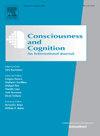Aphantasia and the unconscious imagery hypothesis
IF 2
3区 心理学
Q2 PSYCHOLOGY, EXPERIMENTAL
引用次数: 0
Abstract
Until recently, mental imagery has largely been regarded as an exclusively conscious phenomenon. However, recent empirical results suggest that mental imagery can also occur unconsciously. People who report having no experiences of mental imagery often perform similar to controls on behavioural tasks thought to require imagery. A surprising number of them also display significant levels of imagery-based priming, and recent neural decoding studies have shown that imagery-related information is being processed in their visual cortex. However, investigating unconscious imagery empirically is not straightforward. One challenge is to establish that imagery is genuinely unconscious as opposed to merely going unreported due to response biases. Another is to clarify how imagistic and indirect perceptual processing needs to be to qualify as imagery. In this paper, we take a closer look at the evidence for unconscious imagery, argue that it is not as compelling as it initially appears, and outline a strategy for advancing research on this question.
幻像症和无意识意象假说
直到最近,心理意象在很大程度上被认为是一种完全有意识的现象。然而,最近的实证结果表明,心理意象也可以无意识地发生。报告称没有心理意象经历的人在被认为需要意象的行为任务上的表现与对照组相似。令人惊讶的是,他们中有相当多的人还表现出显著的基于图像的启动能力,最近的神经解码研究表明,与图像相关的信息正在他们的视觉皮层中被处理。然而,从经验上调查无意识意象并不简单。其中一个挑战是确定意象是真正无意识的,而不是仅仅由于反应偏差而未被报告。另一个是澄清意象性和间接的知觉加工需要怎样才能成为意象。在本文中,我们仔细研究了无意识意象的证据,认为它并不像最初出现的那样令人信服,并概述了推进这一问题研究的策略。
本文章由计算机程序翻译,如有差异,请以英文原文为准。
求助全文
约1分钟内获得全文
求助全文
来源期刊

Consciousness and Cognition
PSYCHOLOGY, EXPERIMENTAL-
CiteScore
4.30
自引率
8.30%
发文量
123
期刊介绍:
Consciousness and Cognition: An International Journal provides a forum for a natural-science approach to the issues of consciousness, voluntary control, and self. The journal features empirical research (in the form of regular articles and short reports) and theoretical articles. Integrative theoretical and critical literature reviews, and tutorial reviews are also published. The journal aims to be both scientifically rigorous and open to novel contributions.
 求助内容:
求助内容: 应助结果提醒方式:
应助结果提醒方式:


